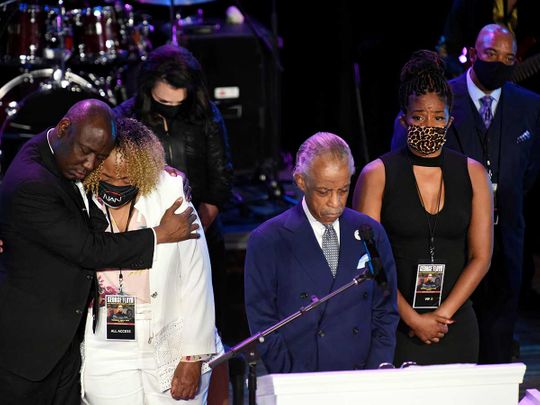
The world bid a tearful goodbye to Floyd on Thursday night
His death while in Minneapolis police custody was certainly not the first instance of alleged assault and use of excessive force against black people in the US. But it seems to have transformed a moment in history into an emblem of racial injustice — with the call to end racial and social discrimination reverberating far beyond the US.
This, as the Reverend Al Sharpton noted, is a different time and a different season.
Just like Floyd’s shining casket under the lights of a darkened sanctuary at his farewell in Minneapolis Thursday night, the global outrage following his death has raised hopes for millions of oppressed voices around the world — and it’s not just about the long-standing pattern of bias in the US justice system.
George Floyd’s death was certainly not the first instance of racial injustice in the US or beyond — but the world can strive to make it the last
In recent months, scientists have been busy in laboratories around the world in trying to find a cure for the Coronavirus pandemic — an infection from which Floyd had recovered last month. But the cure for the pandemic of racism and discrimination that killed George Floyd has been elusive for a very long time.
The outrage and the call for action that followed Floyd’s death seems to have brought that cure within our grasp.
Sombre memorial
Floyd’s sombre memorial itself was a reflection of the multi-ethnic and multi-racial fabric of American life — full of civil rights activists and senators; Congressional representatives and black actors; rappers, preachers and police. Majority and minority who stepped forward in bountiful numbers, their head lowered for Floyd.
Many of them have called for accountability — not just for Floyd’s death, but for the long-standing history of racial injustice and police brutality. Many of them have taken a knee.
Some of that accountability is already in action: the three Minneapolis police officers who arrested Floyd have been charged with abetting his murder, and their bail set at $1 million each. The fourth policeman has already been charged with second-degree murder.
The weeks-long protests have also stirred both Democrats and Republicans in the US Congress to finally call hearings on policing and for lawmakers to plan a bill on police brutality next week.
But this rush for justice and accountability doesn’t need to be confined to the US alone. As the world joins Floyd’s family in mourning his death, it’s also a good occasion to reflect on the still-thriving social, racial or religious biases across all societies.
George Floyd’s death was certainly not the first instance of racial injustice in the US or beyond — but the world can strive to make it the last.








